Macroeconomic indicators turning downward.
There is a recurring commercial going out over Wisconsin airwaves arguing for progress [0], link to . This impelled me to consult some metrics regarding progress in the state, following up on this
post from a month ago.
The situation can be summed up pretty easily:
- Total nonfarm employment continues to decline.
- Contrary to predictions from October’s Wisconsin Economic Outlook, private nonfarm employment continues to decline.
- Local government employment is down by 4700 relative to January 2011, and continues to plummet.
- With the exception of Indiana, no other state in the Fed’s 7th district besides Wisconsin has experienced a sustained decline in its coincident index.
- Looking forward, Wisconsin’s leading indicator continues to signal contraction.
Here are the data underpinning these assessments.
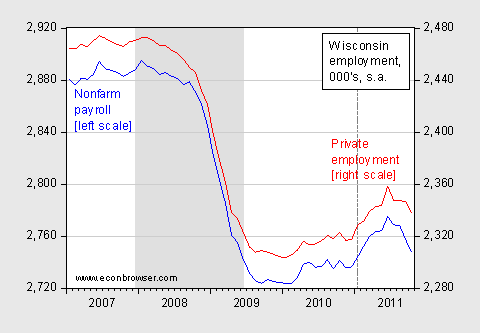
Figure 1: Wisconsin nonfarm payroll employment (blue, left axis), and private nonfarm employment (red, right axis), 000’s, seasonally adjusted, 2007M01-2011M10. NBER defined recession dates shaded gray. Vertical line at 2011M01. Source: BLS.
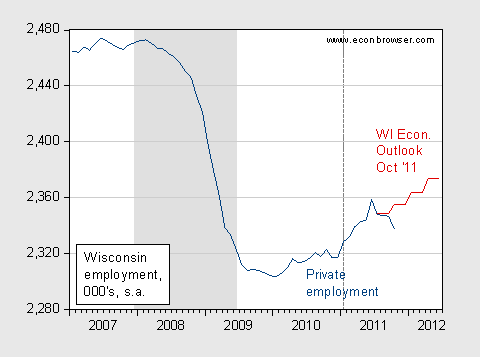
Figure 2: Wisconsin nonfarm private employment, seasonally adjusted (dark blue), and projections from Wisconsin Economic Outlook, in 000’s. NBER defined recession dates shaded gray. Vertical line at 2011M01. Sources: BLS, Wisconsin Economic Outlook.
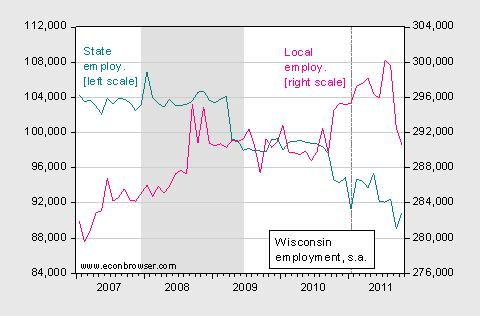
Figure 3: Wisconsin state government employment (teal, left axis), and local government (pink, right axis), 2007M01-2011M10. NBER defined recession dates shaded gray. Vertical line at 2011M01. Source: WI DWD.
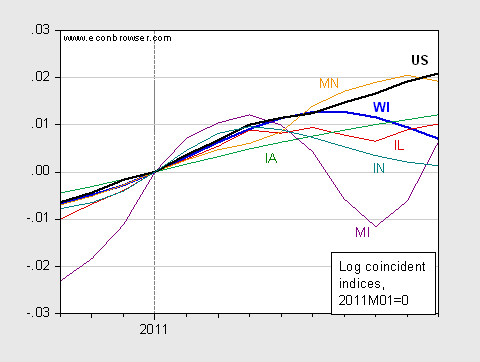
Figure 4: Log coincident index for Wisconsin (WI, bold blue), Illinois (IL, dark red), Indiana (IN, teal), Iowa (IA, green), Michigan (MI, purple), Minnesota (MN, orange), and US (black), all rescaled to 2011M01=0. Vertical line at 2011M01. Source: Federal Reserve Bank of Philadelphia and author’s calculations.
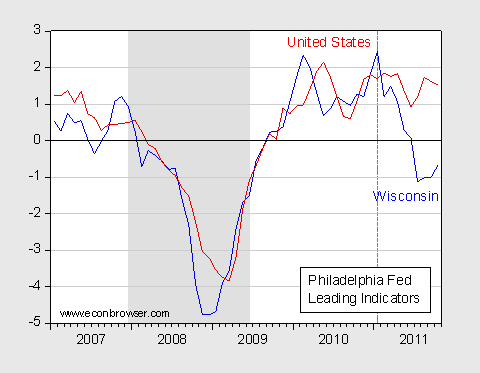
Figure 5: Leading indices, for Wisconsin (blue) and for US (red), 2007M01-2011M10. NBER defined recession dates shaded gray. Vertical line at 2011M01. Source: Federal Reserve Bank of Philadelphia and author’s calculations.
To me, none of this is particularly surprising, as the plans forwarded by Governor Walker were constructed to be maximally contractionary [1] [2].
Parting observations. The Wisconsin unemployment rate in October is half a percentage point higher than January 2011, when Governor Walker took office; in contrast, the national rate has held constant relative to that month. At the pace of job loss recorded in October, November nonfarm payroll, nonfarm private and manufacturing employment will all be at or below the same level recorded in January 2011. Here is Governor Walker’s assessment A Year of Progress for Wisconsin’s Job Climate.
Update, 8pm: Governor Walker raised taxes on (low income workers, renters) [a] and lowered taxes for others (e.g., corporations) [b].
In non-economic breaking news from Wisconsin, First arrest made in John Doe investigation:
…The arrest represents a new direction and development in the secret probe of Walker’s staff while he was county executive and governor.
John Doe investigations are secret proceedings in which witnesses can be subpoenaed and compelled to testify under oath about potential criminal matters and are forbidden from talking publicly about the case.
Prosecutors launched the investigation on May 2010 – around the time Darlene Wink left her county job as Walker’s constituent services coordinator in May 2010. She quit shortly after admitting that she had frequently posted political comments online on Journal Sentinel stories and blogs while on the county clock.
Authorities later took her work computer and executed a search warrant of her home in August 2010. They also took the work computer of Tim Russell, a former Walker campaign staffer who was then working as county housing director.
Sources have told the Journal Sentinel that the probe, which initially looked at campaign activity by Walker staffers, has moved in a number of directions since then.
The long-simmering investigation boiled over publicly in September when a dozen FBI agents and other law enforcement officials raided the Madison home of Cindy Archer, a key Walker aide at the county and the state.
Archer has maintained that she did not campaign on work time.
Since then, No Quarter reported that Walker’s current spokesman Cullen Werwie, who worked on the governor’s campaign, was given immunity to testify in the John Doe probe. Also receiving immunity was Republican operative Rose Ann Dieck.
More recently, a grant of immunity was considered for an unnamed person about four or five weeks ago, according to former Appeals Judge Neal Nettesheim, who is overseeing the investigation.
Why is a political commentator pretending to be an economist?
Menzie- Tell one of your former students about it. Been banging that drum for much of the last month. And you’re leaving out that Wisconsin led the nation in increased jobless claims for Thanksgiving week, and has been a consistent gainer in that category over the last 2 months. You don’t really want to lead in that one.
There is no way this strategy has been successful- even property taxes are going up in a majority of areas (the only places that aren’t have big drops in home values), and the GAAP deficit is higher than before Walker took over (and will go even higher with the lower revenues from going into recession).
Well, unless the idea is to destroy public services through cuts and continual deficits, causing the services to be sold off to campaign contributors….which is the real goal here. Too bad Walker won’t get to see it in the 6 months he has left in office.
Hammy S aka Oh Great aka Ham Sandwich: Thank you for your comment. In your two previous comments, you have written [link]:
and [link]
respectively. Would you be willing to make a substantive, data-based comment at some juncture?
Don’t you understand, Menzie? The sole purpose of economics is to explain why the rich deserve all the money.
This should all be expected. The question is what things will look like in several years. Right now, I feel we have a misguided focus on the short-term. We’re mostly goosing the numbers at a cost of long-term, substantive growth.
Menzie,
Get rid of the uncertainty in Wisconsin and watch the state recover. Until the issue of recall is settled in Walker’s favor the state will still be considered a socialist paradise and businesses will not expand or create jobs. By the way, what about the recovering education system and all the teachers keeping their jobs?
Well, I’m in Indiana, and as you can see from Figure 4, we’ve hit a rough patch as well. I think that there is something going on that is bigger than Wisconsin or Indiana, or perhaps even the Midwest.
The only thing I see as positive is that Indiana state revenues have been beating forecasts even as the unemployment rate has been going up. Perhaps Wisconsin is the same.
With so much state revenue generated by income and sales taxes, this tells me that the economy is probably not as bad as the unemployment rate indicates. Well, at least it is not getting worse, which the rising unemployment rate implies.
BTW, the first thing that Mitch Daniels did when he took office is stop collective bargaining with the unions and stop collecting their dues through payroll deductions. I wonder why he didn’t face Madison style riots when he did so? Just another reason to hate Madison.
From Powerline today:
“I attended a lunch event with Scott Walker today. He is a very impressive guy, up there with Bobby Jindal and one or two others as America’s top governors. He came into office in January 2011 facing a multi-billion dollar deficit, and immediately proceeded to carry out his campaign promises. He balanced Wisconsin’s budget without raising taxes, liberated public employees from the yoke of mandatory union contributions, and enacted reforms that allowed teachers and other public employees to keep their jobs rather than being laid off. As a result, the Left went berserk.”
All that and driving the left nuts – that’s quite a list of accomplishments!
And all you have is a few graphs, Professor.
“And all you have is a few graphs, Professor.”
Graphs that appear to show Gov. Walker’s plans harming the economy. Is that a fair trade off for driving the left nuts?
Steve
In “Lectures on Justice, Police, Revenue and Arms,” retitled “Jurisprucence” in OLL, Adam Smith traces political organization back to the primitive assembly of Herds and flocks. Their owners’ interests,
” … introduced an inequality of fortune, … was that which first gave rise to regular government. … the very end of which is to secure wealth and to defend the rich from the poor.”
But things work in reverse, shall we say due to the human qualities of the rich, “- tyrannical disposition which may almost be said to be natural to mankind –”
By the end of his course, Smith had protection from the rapacity of the poor as a minor, routine function, and all the macroeconomic action we remember him for in the market, dependent on fighting against the interests of,
… “… monopolies and all privileges of corporations, which, though they might once be conducive to the interest of the country, are now prejudicial to it.”
the mechanism for that is of vast interest:
“The riches of a country consist in the plenty and cheapness of provisions, but their [the civil privileges’] effect is to make everything dear. When a number of butchers have the sole privilege of selling meat, they may agree to make the price what they please, and we must buy from them whether it be good or bad. Even this privilege is not of advantage to the butchers, because the other trades are also formed into corporations [‘cartels’ in today’s usage], and if they sell beef dear they must buy bread dear.”
The point is,
” The riches of a country consist in the plenty and cheapness of provisions, but their [the civil privileges’] effect is to make everything dear. But the great loss is to the public, to whom all things are rendered less comestible, and all sorts of work worse done; towns are not well inhabited, and the suburbs are increased.”
This might seem more econ 101 general than your Wisconsin situation; but Smith had already spoken of what happened in the Midwest before the just quoted:
“…small republics, whether conquering or defensive, came at length to a dissolution from the improvements in mechanic arts, commerce, and the arts of war.”
After the section on cartels, much later, comes a the better point for ‘yall:
“The establishment of commerce and manufacturers, which brings about … independency, is the best police for preventing crimes. The common people have better wages in this way than in any other, and in consequence of this a general pobity of manners takes place through the whole country.”
[excuse the interruption but Wisconsin is on the switch between the aristocratic and democratic forms of republic, in Smith’s terms. The above continues:]
“Nobody will be so mad as to expose himself on the highway when he can make better bread in an honest and industrious manner. ”
Menzie, I find figure 3 the more interesting. Keynesian stimulus? What? Where?
BTW, why the sudden increase in local jobs, and stability in state jobs under Bush? Why the gnashing of teeth over a measly ~9K loss off peak in local Govt jobs that doesn’t even drop below the pre-recession numbers?
You might be trying to make a point, but it is buried in political innuendo.
This is all based upon Figure 3.
http://www.youtube.com/watch?v=tELtKMPKAq4&feature=player_embedded#!
Wonderful state you have there…
The view from northern Wisconsin is that the 2012 election needs to run its course and once the current president is removed and the power to remove the oppressive executive orders issued by Obama, there will be a thriving economy instituted in the creation of real wealth. Wisconsin is ahead of the curve due to the 2010 election results and subsequent changes made by the Walker administration. The old Union/Democrat game is over and Walker will not only win any recall, but will be reelected for a second term. Menzie, you have no idea of the wave that is about to hit Washington D.C. We want it that way. Quite diligent work and a return to the things that made America the envy of the world. FYI east coast Thanksgiving poll from my family. 5 generations of which four has voters. In 2008 all but 3 votes out of 32 possible went for Barak Obama, due to Bush failures. This year, Obama received only one vote. Can you imagine that? This year Obama received only 1 out of 35 votes. Tsunami time! Five states where represented there and 3 were key. With control of the house, senate and the presidency you qare going to see such a swing back to truth, real justice and the American way, you just might have to eat your graphs!
I think it would be more productive to tie economic outcomes to economic events and time-frames that make some kind of economic sense rather then arbitrary political time lines with the most recent and hence, unreliable and/or volatile, data.
You can’t draw a line around Wisconsin and say everything within is Scott Walker’s fault anymore than you can around the United States, although the president does exercise far more influence on the national economy then any governor does over a state’s. The entire midwest is in trouble because the old rust belt economies are not globally competitive while the south is much freer regarding economic activity. Collectivism bad, freedom good. That what Tarzan think.
Buzzcut: I don’t think it’s any mystery why Indiana is following a similar trajectory — cutting spending, when not necessary [1], in times of economic slack is not a recipe for growth.
Rich Berger: You’re citing an op-ed as data?
CoRev: Combine state and local, and see what number you get. The point of aggregate demand management is to increase employment when there exists economic slack (and not when you’re at or above potential, as under G.W. Bush).
Steve:Who is “we”? Well, FYI, I can do a poll of my West Coast relatives. Guess what? They’re not voting for the Republicans. But I won’t take that as representative data (just like I don’t take a look at the local shopping mall parking lot to determine the state of economic activity, etc.) Geez.
Hitchhiker: I agree that not all revolves around political events, but the Governor made the comparison. Moreover, while I agree the Midwest has a problem (mitigated by a depreciated dollar), you’ll note that I also plotted coincident indicators for all the other Fed District 7 states. I didn’t download the data just for kicks — it was to show that aside from unfortunate Indiana under the stewardship of Governor Mitch “$50 billion cost for Iraq” Daniels, Wisconsin is the only one trending downward.
Menzie asks: “Combine state and local, and see what number you get.” OK, from employment peaks (407K) to current level I get an astoundingly scary ~6.2% job loss.
The amazing story on Figure 3 is that the local level has still to drop to the pre-recession levels while state employment has steadily dropped starting under the previous administration.
Since you mentioned Bush, it appears his administration can take credit for ~ 10K WI local job gains during his last years. Moreover, the Obama stimulus seems to have had only a modest, ~5K effect on WI public employment.
CoRev A 6.2% job loss is scary when the direction ought to be the other way. You seem to be advocating a pro-cyclical fiscal and employment policy.
Bush…can take credit for ~ 10K WI local job gains during his last years. Or blame. You normally would not want to increase government employment during an economic expansion unless that employment was initiated by a local demand for government services and paid for with tax increases. Again, you seem to have a problem understanding this pro-cyclical versus counter-cyclical thing.
the Obama stimulus seems to have had only a modest, ~5K effect on WI public employment.
Awhile back there was a paper that found much of the economic stimulus was dampened by offsetting decreases in state government employment. A lot of conservatives misunderstood and misrepresented this paper as an argument that stimulus spending is a failed Keynesian idea. That’s what happens when you only read the abstract.
I don’t think it’s any mystery why Indiana is following a similar trajectory — cutting spending, when not necessary [1], in times of economic slack is not a recipe for growth.
The problem with that thesis is that we were doing better until about the summer, and then the unemployment rate started going up again. That doesn’t correlate with spending cuts at the state and local level, which predated the summer.
The Daniels economic development strategy centers around poaching existing businesses from Michigan, Illinois, Ohio, and yes, even Wisconsin. Spending cuts are our advertising strategy. Sometimes it even works. Honda announced yesterday that they are bringing Acura production to Indiana, which is good news.
Of course, it helps that the weather in Indianapolis is quite a bit better than anywhere in Wisconsin or Michigan. 😉 Of course, you know that it can’t get much worse than Madison. Well, maybe Ann Arbor.
I don’t think it’s any mystery why Indiana is following a similar trajectory — cutting spending, when not necessary [1], in times of economic slack is not a recipe for growth.
The problem with that thesis is that we were doing better until about the summer, and then the unemployment rate started going up again. That doesn’t correlate with spending cuts at the state and local level, which predated the summer.
The Daniels economic development strategy centers around poaching existing businesses from Michigan, Illinois, Ohio, and yes, even Wisconsin. Spending cuts are our advertising strategy. Sometimes it even works. Honda announced yesterday that they are bringing Acura production to Indiana, which is good news.
Of course, it helps that the weather in Indianapolis is quite a bit better than anywhere in Wisconsin or Michigan. 😉 Of course, you know that it can’t get much worse than Madison. Well, maybe Ann Arbor.
Prof Chinn:
I cited a blog post that listed some actual accomplishments. Which ones do you dispute?
Rich Berger: Well, for one, he did raise taxes on the working low-income, and renters — see note [a] in the update. The other points I agree are more of interepretation — “liberated” is a word that one could also use for Sudetenland 1938 (but I would not).
Menzie-
I think the idea of counting a reduction in a credit (for those who do not pay taxes) is a bit tendentious. But even under the most extreme interpretation Walker “raised” taxes by $49 million out of a $3.6 billion shortfall (or $70 million if you use the final number that was passed). Now that the union employees have been liberated from mandatory dues, how many are voluntarily coughing up the cash?
If that’s the best you have…..
Rich Berger: I see your point. Define tax cuts as only tax cuts when applying to corporations and the non-low-income. OK. Got it. Sort of like, it’s not a tax cut when it’s a payroll tax reduction, but it is if you take income tax rates down for those with incomes above $250K. Orwellian is an understatement here.
You can only cut taxes for those who pay taxes.
Rich Berger: Then the tax rate reductions or exemptions for corporations (e.g., some Fortune 500 multinationals) that currently pay no taxes do not experience any tax reduction are not really tax rate reductions?
Anyway, I think some of the renters in WI who do pay taxes would disagree with you. And did you even read the link? I betcha some of those people receiving EITC did pay taxes — or do you know something I don’t?
I did read the link and without examining WI tax law in detail (or digging up more statistics), I cannot rule out that some EITC beneficiaries paid some tax. That was my point in my earlier post – if you assume that the entire amount ($49 or $70MM) was due to increased taxes and not a reduction in grants, it was peanuts compared to the budget shortfall.
Incidentally, I understand that Mickey Mouse and Adolph Hitler are in favor of Gov. Walker’s recall.
I think the headline should be the Log Coincident graph. Before the financial sector meltdown all these midwestern states were toeing the national average – except Michigan; which we can reasonably attribute to the travails within the auto industry. Post financial crisis we see a scattered divergence of outcomes.
Examining these outcomes should tell us something; what worked and what didn’t work. Consider Iowa; is this a case of agriculture having become a relatively stable basis for an economy – though with slightly lower expectations?
It also seems a case can be made (WI, IN, MI) that the gubernatorial attack on public unions is INVERSELY related to economic growth. I.e., austerity is contractionary. Well duh, how many times does Paul Krugman have to beat one over the head before one starts believing him?
******************************
Re: Ricardo’s “Get rid of the uncertainty in Wisconsin and watch the state recover.”
LOL. Yes, the uncertainty monster. I’m sure he has DATA to back that up. Of course nationally that’s a standard GOP meme. What they DON’T tell you is the uncertainty is all caused by GOP action/inaction.
Richy Rich- Unlike you, I actually live in Wisconsin under Scott Walker, and I can tell you the budget ain’t balanced, and taxes didn’t go down (well, unless you were a public employee and had your take-home pay docked by $3,600 a year, or are one of the 27,600 that lost jobs between June and October here). The Philly Fed don’t lie.
No wonder he’s always out of state speaking to some oligarch group that you hang out with, because folks like you have no clue how much of a failure he is fiscally, economically, and in general leadership skills. Walker’s home county voted against him 62-38 last November, and the state might do the same now that they know what he’s about.
As a former Hoosier, I can also tell you that Daniels is every bit the failure in Indiana, with the same cuts to education, and same selling off of resources to corporate contributors. And guess what, they’re the only state in Big Ten Country to lose jobs over the last 12 months – and it’s not like they did much in the 6 years before that. It ain’t a coincidence.
All Richie has is snark in his little bubble world. It’s such a weak act. Fortunately, us in the real Wisconsin know better than you, and it’s why nearly a million of us will sign Walker’s recall petition by the time this is over.
P.S. The only people signing Mickey Mouse are clowns like you who think that passes for sabotage and wit. Faux outrage ain’t the real outrage that has been the Scott Walker disaster, and Faux News ain’t reality there, little guy.
Fake Jake
The facts seem otherwise. http://badgerstat.org/2011/budget/
Actually, Mitch is about to sell off another state asset.
And more than likely, we’ll have right-to-work before the end of this legislative session. But Mitch is not the driver on that initiative.
The only state in the 7 state midwest region that has done reasonably well over the last year is Minnesota, with its Democratic governor. Iowa (with its GOP governor) has actually lost jobs although the unemployment rate has been steady thanks to more people dropping out of the labor force. Similar story in Michigan. Total employment was trending upward until the new GOP governor took over, with total employment turning downward shortly after his inauguration. Total employment in Indiana has been flat, but total unemployment and the unemployment rate has been increasing. In Wisconsin the unemployment rate was 7.4% when Walker took over. The latest BLS data shows that it’s now up to 7.8%. Illinois does have a Democratic governor and things are clearly getting worse. So in summary, states with Democratic governors split evenly…one getting better and the other getting worse. States with GOP governors are 5 for 5, with all getting worse. And it’s unanimous that in every case where a Democrat took over from a Republican things have gotten better, and in every case where a Republican took over from a Democrat the employment situation has gotten worse. Coincidence?
Rich Berger A lot of Walker’s “balanced budget” is smoke and mirrors because he simply shifted a lot of the shortfalls off onto other budget categories and then reported a projected $300M surplus in the main account. He also excluded various tax receipt obligations owed to Minnesota and a $200M court judgment against the state.
As if you needed more evidence of the abject failure of Scott Walker and this contractionary, “distribute-money=upwards” mentality, here it is. 14,600 more jobs lost in November, and now 34,900 lost since the budget was passed in June (at the same time, the U.S. has gained around 700,000 jobs). Looks like Menzie needs to update the charts.
So what does his (3rd) DWD Director (in less than a year) try to do? Spin the hell out of the numbers and blame BLS methodology! These people are FINISHED and just have no clue. But hey, as long as Texass Swift Boaters throw $250K at Walker, he and his lackeys can still think they have a chance, and waste more money of the “job creators.” 😛
“Coincidence?” ~2slugbaits
If you have to ask, your lack of understanding of causality is painfully lacking. But I would expect that from someone who would simply assume that the current Democratic governor in MN was that cause of it’s lack of crap versus the current legislator controlled by the Republicans. Or that it was due to the work of previous governors that helped Minnesota avoid taking a huge dive.
Allen There’s a good reason why GOP governors are underperforming, and that is because they still misunderstand the nature of the economic crisis. They still think it’s a structural problem, and they continue to look to structural remedies as the solution. For example, they continue to think the economy is in the dumper because of high wages, generous public servant benefits, high taxes, etc. GOP governors are simply wrong. Unemployment is primarily cyclical and you need to look to counter-cyclical solutions. By and large Democrats understand this and Republicans don’t.